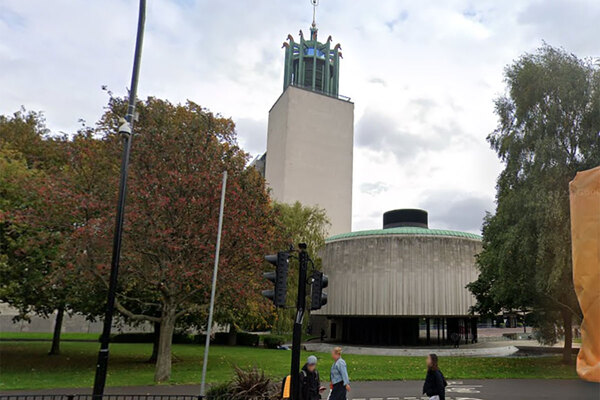You are viewing 1 of your 1 free articles

We have a chance to redesign the homelessness system
From the current crisis, a better world could emerge, says Dr Lígia Teixeira, chief executive of the Centre for Homelessness Impact
Last Thursday, housing minister Luke Hall wrote to councils in England to ask them to house all street homeless people over the weekend. The letter included a line that caught my eye: “In the longer term it will of course be necessary to identify step-down arrangements for the future, including the reopening of shelter-type accommodation.”
The implication here is that, when the coronavirus pandemic is over, we will need to go back to how things were. But we have a once-in-a-lifetime opportunity to redesign the homelessness system in the UK.
Knowing that public health emergencies always take an increased toll on groups at risk such as people with experiences of homelessness, the government and local areas have rightly been busy doubling down their emergency response. This work is extremely important.
However, if history teaches us one thing, it is that you never want a serious crisis to go to waste. With all the worry and uncertainty surrounding the coronavirus pandemic, each day seems to bring news that’s worse than the last. But while the concern we are all feeling is justified, there are reasons to be optimistic about the future.
The pandemic came at a time when homelessness remained stubbornly high in many parts of the country.
“When this ends, the public will be better able to see how our fates are linked, how we all benefit from a society without homelessness”
2020 can mark a definitive turning point. But only if we use the coronavirus pandemic to step up the ambition to end rough sleeping and embrace the opportunity to tackle all forms of homelessness more effectively. This is a historic opportunity for the government in all parts of the UK at national and local levels to seize measures and interventions to recover from the impacts of coronavirus as the moment to gear the system firmly towards the primary prevention of homelessness. To take action to stop new people from becoming homeless, while redesigning local systems and accelerating the transition away from crisis services and accommodation.
At the moment, leaders at all levels of national and local government are rightly very much preoccupied with the current turmoil. But in the same way that we know that the race to find a vaccine is just as important as public health interventions and the availability of medical treatment, when it comes to homelessness the aim should be to respond to the immediate emergency, while maximising on this opportunity to achieve a step change in the longer term. ‘Business as usual’ would not be good enough post-pandemic.
Five reasons to be optimistic
There are reasons to be optimistic about the future, even if they may be hard to see now. Here are a few:
- Coronavirus has brought us together. Everyone – regardless of where you live, what you do or whether you have a home – is threatened by the virus. When faced with a shared external threat, people begin to look past their differences. We’ve already witnessed the ascendance of altruism, compassion and generosity of spirit and action. Many people and organisations have stepped up to help people who are homeless or at risk of losing their homes. When this ends, the public will be better able to see how our fates are linked, how we all benefit from a society without homelessness, not just those affected, and what they can do to help.
- The government has taken action. A raft of emergency measures have been introduced to keep people housed and bring in those who are street homeless in face of the pandemic. For instance, £3.2m to support local authorities, the suspension of all housing possession proceedings, raising the Local Housing Allowance rates to cover the lowest 30% of private rented housing, and pausing all evictions and terminations of asylum support for three months. Given this is playing out against a backdrop of pre-existing affordable housing and homelessness issues, ongoing action will be needed to avoid a surge in homelessness when the pandemic ends.
- There is a new appreciation for data and evidence. The coronavirus pandemic has already highlighted the fact that existing data is not adequate to help respond to a situation like this. The dynamic nature of epidemics means that it is constantly evolving, with transmission shifting to different environments. In this setting, real-time data becomes indispensable for guiding strategy, co-ordinating multiple interconnected interventions, and troubleshooting breakdowns in execution. Thus, investments in improving information systems should be considered as integral for strengthening our response at both national and local levels now and post-pandemic.
“The COVID-19 pandemic has exposed shortcomings in the homelessness and health systems that provide an important opportunity to improve them”
- An opportunity to take stock and stop doing what doesn’t work. With ‘business as usual’ on hold for many of us, history shows that public health emergencies can be a great opportunity to reflect and take stock. In the past, Shakespeare used a shutdown of theatres in 1590 to write poetry, and during an outbreak in 1665, Cambridge sent its students home – including Sir Isaac Newton, who used the opportunity to sit near an apple tree and unlock a fundamental law of physics. The COVID-19 pandemic has exposed shortcomings in the homelessness and health systems that provide an important opportunity to improve them. To come together to reimagine and redesign the local response around people experiencing or at risk of homelessness. Our response to both homelessness and future pandemics should improve if we do this and introduce measures that focus on investing in stopping people at risk from becoming homeless and accelerate the transition away from crisis services and accommodation. Here the determining success factor will not only be the level of money in the system to support this thinking and work, but where the money goes.
- The internet exists. Because of this, people in isolation or quarantine can ask for help, visit friends, and ‘see’ family and doctors virtually. They can keep entertained with streaming services and social media. Imagine not being able to use the internet without constraints just now – it’s the reality that many people without a home face. This situation highlights the digital divide, the online haves and have-nots in society. The goal should be to figure out how the digital gap might be bridged once and for all. Maybe free broadband for people who are homeless would help so they can stay connected and perhaps more meetings with support workers and the like could be moved online.
One thing is certain: ongoing action will be needed to keep people housed in the face of the coronavirus pandemic. And this is before you take into account people who were in touch with the homelessness system prior to this emergency. Sustainable reductions need to be the result of the right policies, not emergency measures. The good news is that we’ve already started taking steps in the right direction, and it will be important for the government and local areas to continue to act fast, with clarity, while also taking the long-term view.
There is a historic opportunity we cannot miss. And the deciding factor will not only be the level of money dedicated to this work, but the direction of the money. So let’s embrace the current crisis for what it is: a once-in-a-lifetime opportunity to end homelessness for good in the UK.
Dr Lígia Teixeira, chief executive, Centre for Homelessness Impact
More on coronavirus
To see all our coronavirus coverage to date – including the latest news, advice to providers, comment and analysis – use the link below.
Sign up for our daily newsletter
Already have an account? Click here to manage your newsletters















